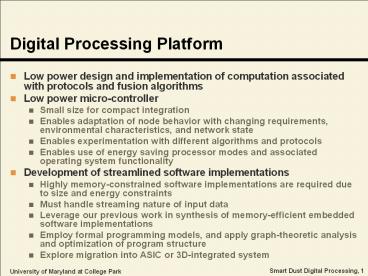Digital Processing Platform - PowerPoint PPT Presentation
Title:
Digital Processing Platform
Description:
Digital Processing Platform Low power design and implementation of computation associated with protocols and fusion algorithms Low power micro-controller – PowerPoint PPT presentation
Number of Views:66
Avg rating:3.0/5.0
Title: Digital Processing Platform
1
Digital Processing Platform
- Low power design and implementation of
computation associated with protocols and fusion
algorithms - Low power micro-controller
- Small size for compact integration
- Enables adaptation of node behavior with changing
requirements, environmental characteristics, and
network state - Enables experimentation with different algorithms
and protocols - Enables use of energy saving processor modes and
associated operating system functionality - Development of streamlined software
implementations - Highly memory-constrained software
implementations are required due to size and
energy constraints - Must handle streaming nature of input data
- Leverage our previous work in synthesis of
memory-efficient embedded software
implementations - Employ formal programming models, and apply
graph-theoretic analysis and optimization of
program structure - Explore migration into ASIC or 3D-integrated
system
2
Example of Software Structure
Receiver
No new data
Periodic wake-up
Sensor
Transmitter
No
Broadcast new data
Extract data
Need to update neighbors?
Yes
3
Protocol Set-up and System Configuration
- Handshaking
- Source channel coding
- Integrate with transceiver to establish PLL
timing - Establish error correction coding
- Establish low-complexity decoding
- Assign transmission power
- Assign processing tasks to network nodes
4
System-level Optimization ExampleTask
Assignment Algorithms
- Need to balance communication and computation
throughout the network - Develop models of power consumption in network
nodes and communication links - Develop task graph models of overall network
functionality - Develop algorithms to embed task graph algorithm
specifications into the network - Assign processing tasks to network nodes
- Turn off idle nodes
- Large design space
- Explore evolutionary algorithms to optimize task
graph embeddings
5
Evolutionary Algorithms
Decoding function
Genetic operators
Genotype space(Genetic representation)
G(t)
6
Digital Design Summary
- Contributions
- Low power, memory-constrained implementation
techniques - Application-specific optimization of software and
VLSI - Integrated optimization of protocols and system
configuration - Selected Prior Work
- N. K. Bambha, S. S. Bhattacharyya, J. Teich, and
E. Zitzler. Systematic integration of
parameterized local search in evolutionary
algorithms. IEEE Transactions on Evolutionary
Computation. To appear. - S. S. Bhattacharyya. Hardware/software
co-synthesis of DSP systems. In Y. H. Hu, editor,
Programmable Digital Signal Processors
Architecture, Programming, and Applications,
pages 333-378. Marcel Dekker, Inc., 2002. - P. K. Murthy and S. S. Bhattacharyya. Shared
buffer implementations of signal processing
systems using lifetime analysis techniques. IEEE
Transactions on Computer-Aided Design of
Integrated Circuits and Systems, 20(2)177-198,
February 2001. - S. S. Bhattacharyya, R. Leupers, and P. Marwedel.
Software synthesis and code generation for DSP.
IEEE Transactions on Circuits and Systems --- II
Analog and Digital Signal Processing,
47(9)849-875, September 2000.



























![How to Start a Digital Marketing Agency in India? [Step by Step Guide] PowerPoint PPT Presentation](https://s3.amazonaws.com/images.powershow.com/9441593.th0.jpg?_=202005190312)



